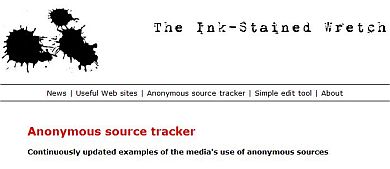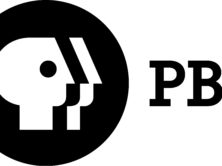
The Ink-Stained Wretch's Web site features an anonymous source tracker. When media sites post stories with unnamed sources, the Ink-Stained Wretch probably reports it. (Detail from screen capture of Web site banner)
A Kentucky editor has designed an online anonymous source tracker to note (almost) every time the news organizations on Google News use anonymous sources.
Mark Schaver, an assistant metro editor for The Courier-Journal, which covers the greater metropolitan Louisville area, posted the tracker Feb. 10 on one of his blogs, Ink-Stained Wretch.
Since its launch, the tracker has reported at least 13,725 examples in 2,471 news outlets (as of April 20, 3:02 PM EST). BusinessWeek is its highest offender, with 1,200 links.
However, Schaver wrote in an e-mail to iMediaEthics that the tracker does pull in some false hits and he doesn’t actively check the site for them. “If an item comes to my attention that isn’t an actual use of an anonymous source, I remove it,” Schaver wrote. The software program doesn’t find all uses of anonymous sources. Schaver cautioned on the Ink-Stained Wretch, that each news outlet’s count “shouldn’t be considered valid rankings.”
Schaver explained Feb. 13 on his other blog, Depth Reporting, that he wanted to use his Web site, the Ink-Stained Wretch, for online journalism experiments. The tracker is his first experiment.
He also wrote that there are certain situations where the use of anonymous sources may be warranted, but that “anonymous sources are often used for the mundane” and “as a lazy alternative to doing the work required to get someone on the record.”
The list is updated hourly and runs off of Google News. On Depth Reporting, Schaver wrote that the tracker “only searches for a set of commonly used phrases to identify anonymous sources, so if a source is referenced differently, it won’t be included. And it draws its information from Google News, whose search algorithms are a mystery.”
Schaver wrote to iMediaEthics by email that he plans on running the tracker indefinitely. But if there are any serious changes to or objections from Google News, Schaver said he might have to discontinue it.
The Courier-Journal‘s policy is no anonymous sources unless there are exceptional circumstances and top editors’ approval, Schaver wrote. He wrote that wire service copy run by The Courier-Journal does sometimes include anonymous sources.
“My personal view is that they’re only justified in rare circumstances and are way overused, as I think the tracker shows.”
The Courier-Journal, Schaver’s employer is included in his source tracker, he wrote.
The Society of Professional Journalists’ code of ethics states reporters need to identify as many sources as possible and “always question sources’ motives request for anonymity.” The code warns: “The public is entitled to as much information as possible on sources’ reliability.”





